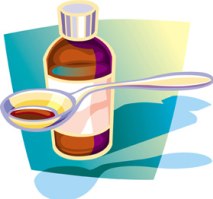Over the counter cold medicines Over-the-counter (OTC) medications can be bought at your local drug store ALWAYS TALK TO YOUR PEDIATRICIAN BEFORE GIVING ANY MEDICATIONS TO YOUR CHILD • Fever or Pain relief If your child has a mild fever but is playing, drinking fluids and generally acting well, there is no reason to treat the fever. However, if your child complains of headaches, body aches or seems irritable, there are fever reducers such as acetaminophen and ibuprofen that may help him feel better. Given in the correct dosage, acetaminophen and ibuprofen have few side effects and are quite safe. They come in drops for infants, liquid ("elixir") for toddlers, and chewable tablets for older children. The infant drops are stronger than the liquid elixir for toddlers. Some parents make the mistake of giving higher doses of the infant drops to a toddler thinking the drops are not as strong. Be sure the type you give your child is appropriate for his weight and age, if you are not sure about the dose, call your pediatrician. Ibuprofen tends to be more effective than acetaminophen in treating high fevers (103 degrees Fahrenheit or higher). However, ibuprofen should only be given to children older than 6 months. Never give it to a child who is dehydrated or vomiting continuously. If your child has a kidney disease, asthma, an ulcer or other chronic illness, ask your pediatrician if it is safe for your child to take ibuprofen. Do not use ibuprofen or acetaminophen with any other pain reliever or fever reducer, unless directed by a doctor. Remember, some cold remedies contain these in combination with other medications.Combinations of antihistamines and decongestants can have side effects such as hyperactivity, sleeplessness and irritability. Giving your child more than one cold medicine to treat different symptoms can be dangerous. Many cold medicines contain acetaminophen or ibuprofen. If you are already giving your child acetaminophen or ibuprofen in addition to the cold medicine, this can lead to overdose. Read labels carefully. Check with your pediatrician before giving your child any cold medicines. • Cough Syrups Coughing helps the lungs clear out germs. A cough is "productive" if it sounds like mucus is being brought up. You can best relieve it by humidifying the air in your child's bedroom to loosen mucus. Be sure to clean the humidifier frequently to prevent mold and bacteria buildup. Some cough medicines, called expectorants, also may help loosen mucus. However, avoid using cough suppressants, as coughing is necessary to clear the lungs. Check with your pediatrician before giving your child cough medicines or expectorants. Cough syrups may not relieve cough caused by asthma. • Antihistamines Antihistamines can relieve runny noses, itchy eyes and sneezing due to allergies (but not colds). They also relieve itching from chickenpox or insect bites and may even control hives or other allergic reactions. They can make some children sleepy. In other children they may cause irritability and nervousness, making it difficult for them to rest. For that reason, avoid giving an antihistamine at bedtime until you know it will not make your child have trouble sleeping. Decongestants can relieve stuffiness due to allergies or colds. However, decongestants taken by mouth can have a number of side effects. Children taking these medications may act "hyper," feel anxious, have a racing heart or find it difficult to sleep. These medications should be used very sparingly. Decongestant nose drops can temporarily shrink the membranes in the nose and make breathing easier. However, they should never be given to an infant because too much of the medication can be absorbed through the membranes of the nose. Also, the more they are used, the less effective they become and symptoms can return or even get worse. Do not give your child decongestant nose drops for more than two to three days unless your pediatrician advises you to continue this treatment. (saltwater/saline) Infants and toddlers cannot blow their nose. If your child is sleeping well and eating happily, there is no need to treat the stuffy nose. But if your child is unable to sleep or eat because of thick mucus, saltwater nose drops can help clear the nose. Put a drop or two into a nostril at a time.
|
||
Salud+HealthInfo is for information and educational purposes only. You should not rely on this information as a substitute for personal medical attention, diagnosis or hands-on treatment. If you are concerned abut your health or that of a child, please consult your family's physician or health provider immediately and do not try to diagnose yourself. Salud+Health Info is published and distributed free of charge by Info Option Network (ION) Publishing Company. Copyright © 2001-2009 Info Option Network About Us | Privacy Policy | Disclaimer | Contact Us TEL- 619-427-4111 - Health@infooption.com |
||
Bienvenido a la primer revista dedicada al cuidado de la salud
 info
info
The first, the best & the only English & Spanish Magazine in San Diego, California


 or grocery store without a doctor's order. This does not mean that OTCs are harmless. Like prescription medications, OTCs can be very dangerous to a child if taken incorrectly. You need to read and understand the instructions before giving OTCs to your child.
or grocery store without a doctor's order. This does not mean that OTCs are harmless. Like prescription medications, OTCs can be very dangerous to a child if taken incorrectly. You need to read and understand the instructions before giving OTCs to your child.